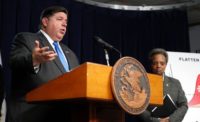House Transportation and Infrastructure Committee Chairman Bill Shuster has unveiled a sweeping infrastructure funding proposal covering a variety of transportation and non-transportation categories and including a sizable boost in federal motor-fuels taxes to shore up the long-struggling Highway Trust Fund.
In releasing the 108-page, five-year proposal on July 23, the Pennsylvania Republican characterized it as a “discussion draft” that “does not represent a complete and final infrastructure bill” though it is in the form of legislative language. [View proposal text here, and section-by-section summary here.]
Instead, he said, the plan “is meant to reignite discussions” about infrastructure on Capitol Hill.
Those comments reflect the realities that passing a comprehensive infrastructure package this year is extremely unlikely, given the tight legislative calendar in a Congress with sharp partisan divisions and that Shuster himself will be stepping down from Congress at the end of the session.
David A. Raymond, American Council of Engineering Companies president and CEO said in a statement, "Shuster’s plan should help reinvigorate public debate on infrastructure."
He added, "But with elections around the corner and Shuster himself retiring, this plan is likely dead before arrival. It should have been offered 18 months ago.”
Brian Turmail, spokesman for the Associated General Contractors of America, said via email, “We welcome the new measure because it will stimulate a needed debate about the best way to make long-term dedicated funding for needed improvements to infrastructure.“
Dennis Slater, Association of Equipment Manufacturers president, called Shuster’s plan “a step in the right direction to reclaiming America’s infrastructure advantage, which will help create jobs and continue to grow our economy.”
Lloyd Brown, an American Association of State Highway and Transportation Officials spokesman, says, “There’s a lot that we do like in the proposal and we think it’s a good place to start the conversation.” Among the provisions AASHTO welcomes are those aimed at speeding project reviews and canceling a $7.6-billion highway aid recission now slated for July 1, 2020.
A central part of the plan is a proposed fuels-tax boost, of 15¢ per gallon for gasoline and 20¢ per gal. for diesel, phased in over three years. After that, the fuel taxes would rise annually to account for inflation. The current gas and diesel tax is 18.4¢ per gal. In addition, a new 10% levy would be imposed on batteries that power motor vehicles.
The American Road & Transportation Builders Association calculates that the package of tax hikes would add $123 billion to the trust fund over 10 years.
But in another dramatic move, Shuster would end the fuel taxes on Sept. 30, 2028. That provision is coupled with another to set up a commission that by Jan. 15, 2021, would recommend a trust-fund remedy that doesn’t include enacting a federal tax on gas or diesel. Congress then would vote on the panel’s recommendation.
A House Transportation and Infrastructure Committee aide says, "The chairman believes that those [motor-fuel taxes] are not sustainable user fees for the future of financing our highways and bridges and transit systems,"
Taxes, however, fall under the purview of the Ways and Means Committee, not Transportation and Infrastructure.
There is wide agreement that the trust fund needs a rescue plan. The transportation committee notes that the Congressional Budget Office projects that, without additional revenue, the trust fund will drop into a deficit as soon as fall 2020 and faces a total shortfall exceeding $160 billion by autumn 2028.
In addition, the proposal would authorize $3 billion over five years for a “national infrastructure investments program,” which appears to be similar to the Dept. of Transportation’s BUILD—formerly TIGER—grants program.
Congress has appropriated several hundred million dollars, or more, per year since 2009 for the BUILD/TIGER program. But it lacks a formal congressional authorization.
For water programs, Shuster's blueprint would authorize $3 billion annually for five years for the Clean Water State Revolving Funds, which help finance wastewater-treatment projects.
For the Army Corps of Engineers civil-works program, the framework includes a new “budgetary mechanism” to allow all revenue flowing into the Harbor Maintenance Trust Fund to go to port dredging projects.
The proposal would establish a $10-billion capital revolving fund to construct and renovate federal buildings and a pilot program to use public-private partnerships to complete three to five buildings projects.
Story updated to include information and comments from AASHTO, ARTBA and ACEC.




Post a comment to this article
Report Abusive Comment